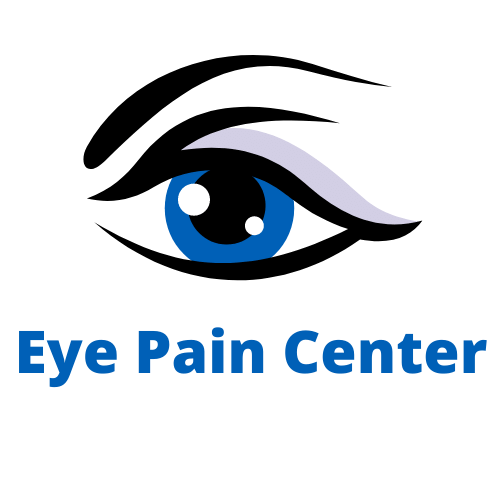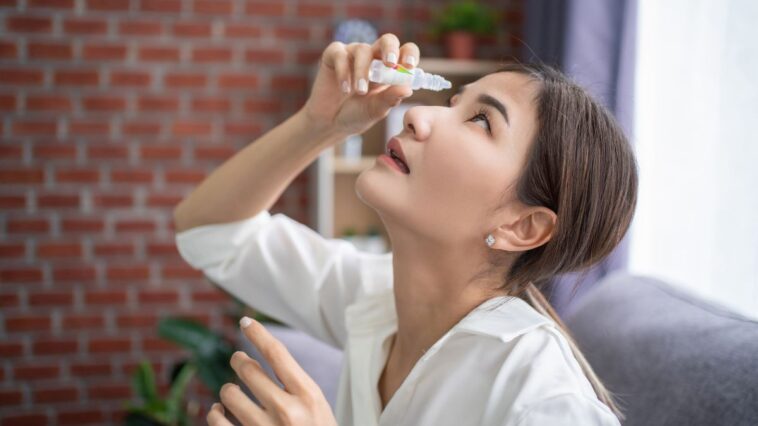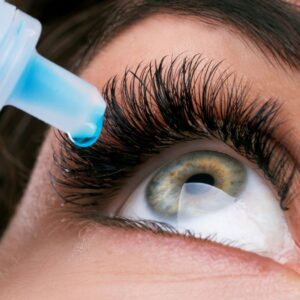What Causes Dry Eyes?
A dry eye is a common condition where the eyes do not produce enough tears or evaporate too quickly. This can cause discomfort, redness, and a gritty eye feeling. Some common causes of dry eyes include:
- Environmental factors: Dry eyes occur when the eyes become irritated due to insufficient lubrication or moisture. Common environmental triggers of dry eye include exposure to wind, sun, and dry or dusty environments and conditions.
- Aging: As we age, we are more likely to experience dry eyes. This condition occurs due to a decrease in the production of tears by our eyes with advancing years.
- Medications: Several medications, such as antihistamines, decongestants, blood pressure medications, and birth control pills, can lead to dry eye syndrome.
- Medical conditions: Dry eyes can be caused by various medical conditions, such as autoimmune diseases, arthritis, and diabetes. These conditions can affect how your body produces tears and cause dry eyes.
- Hormonal changes: Dry eyes can be a symptom of hormonal changes, such as during menopause.
- Lifestyle factors: Too much use of digital gadgets, reading, or spending lots of time in front of the computer can also lead to dry eyes.
- Blink rate: Infrequent blinking, especially with digital devices, can cause the eyes to become dry.
See an eye doctor if you have symptoms of dry eyes, as they can help determine the underlying cause and recommend adequate treatment.
The Benefits of Natural Treatments for Dry Eyes
There are several benefits to using natural treatments for dry eyes, including:
- No side effects: Natural remedies may offer relief without unpleasant side effects sometimes associated with prescription medications.
- Convenient and easy to use: Many natural remedies can be performed at home, making them a convenient and accessible option.
- Cost-effective: Natural remedies are often less expensive than prescription medications, making them a cost-effective option for those concerned about the treatment cost.
- Holistic approach: Natural remedies take a holistic approach to treating dry eyes, addressing not just the symptoms but also the underlying causes of the condition.
- Safe for long-term use: Unlike prescription medications, natural remedies are often safe for long-term use and do not have the potential for dependence or addiction.
It is always a good idea to consult your eye doctor before trying any new treatment, especially if you have a pre-existing medical condition or are taking any medications.
Home Remedies for Dry Eyes
Looking for natural ways to relieve the discomfort caused by dry eyes? Here are some home remedies for dry eyes that you can use:
- Warm compresses: If you are suffering from dry eyes, one remedy to try is a warm and moist compress. Applying this compress to your closed eyelids can help increase tear production and relieve the uncomfortable symptoms associated with dry eyes.
- Blink regularly: Blinking is a great way to keep your eyes moist and lubricated, especially in front of digital devices, which can cause dry eyes. Ensuring you blink regularly is an easy and effective way to prevent dry eyes.
- Use artificial tears: Artificial tears are often recommended to reduce the discomfort caused by dry eyes; these artificial tear drops can be purchased without a prescription and help lubricate the eyes and relieve symptoms.
- Increase your omega-3 intake: Eating a diet rich in omega-3 fatty acids, such as salmon, walnuts, and flaxseed, can help improve tear film and reduce dry eye symptoms.
- Reduce screen time: Taking frequent breaks and reducing your screen time, especially at night, can help relieve dry eyes caused by prolonged computer use.
- Clean your eyelids: Regularly clean your eyelids using mild soap and water, and avoid using makeup that can irritate the eyes and worsen dry eye symptoms.
- Use a humidifier: Keeping the air in your home or office moist can help reduce dryness and prevent dry eye symptoms.
It’s essential to remember that everyone is different, and what works for one person may not work for another. If your symptoms persist, it’s best to see an eye doctor to determine the underlying cause and receive an appropriate treatment plan.
Supplement and Nutrition Tips For Relief From Dry Eyes
Several dietary and supplement tips can help relieve the symptoms of dry eyes:
- Increase your omega-3 intake: Eating foods that are rich in omega-3 fatty acids, such as salmon, walnuts, and flaxseeds, may help to improve the tear film of your eyes and reduce symptoms related to dryness. An alternative is to take a fish oil supplement for an added boost.
- Consume more vitamin A: Vitamin A helps to produce and promote healthy tears, keeping your eyes lubricated. To get your vitamin A fix, incorporate carrots, sweet potatoes, and spinach. These vitamin-rich foods will help provide the essential nutrients for healthy eyes.
- Stay hydrated: Keep your eyes hydrated and alleviate dry eyes with a straightforward solution: drink plenty of water! Water intake can help keep the tear film balanced, alleviating any signs or symptoms of dry eye.
- Consider taking a multivitamin: A balanced and nutritious diet can help improve overall eye health and reduce dry eye symptoms. A multivitamin can ensure you get the recommended daily intake of vitamins and minerals.
- Limit caffeine and alcohol consumption: To reduce the symptoms of dry eyes, it is vital to limit the consumption of substances such as caffeine and alcohol which can cause dehydration and worsen the symptoms.
It’s crucial to remember that supplements should not substitute for a balanced and nutritious diet.
Best Ways to Prevent Dry Eyes
Here are some practical ways to prevent dry eyes:
- Blink regularly: One cause of dry eyes is not blinking enough, particularly when looking at screens or digital devices. Regular blinking is essential to keep your eyes lubricated to combat this issue.
- Reduce screen time: Avoiding excessive screen time is one way to help prevent dry eyes. Try to take frequent breaks and limit your time in front of digital screens, especially at night, as it can cause strain to your eyes and could lead to the condition.
- Use a humidifier: A helpful way to ease dry eye symptoms is to use a humidifier. Keeping the air in your home or office area moist will help reduce feelings of dryness and alleviate the signs of dry eye.
- Wear protective eyewear: Protect your eyes when spanning time outdoors to help prevent dry eyes: Wear sunglasses or goggles to shield your eyes from wind, sun, and dust.
- Avoid irritants: Exposure to smoke, strong chemicals, or other irritants can exacerbate dry eye symptoms. Try to avoid these irritants as much as possible.
- Maintain a healthy diet: Eating a balanced diet rich in vitamins and minerals, especially omega-3 fatty acids, can help maintain overall eye health and prevent dry eye symptoms.
- Stay hydrated: Drinking plenty of water can help keep your eyes hydrated and prevent dry eye symptoms.
- Clean your eyelids: Regularly clean your eyelids using mild soap and water, and avoid using makeup that can irritate the eyes and worsen dry eye symptoms.
These preventative measures can help reduce your risk of developing dry eye syndrome and maintain healthy and comfortable eyes.
When To See an Eye Doctor
You should see an eye doctor if you experience any of the following symptoms:
- Persistent dry, itchy, or burning eyes
- Blurred vision or trouble seeing at night
- Sensitivity to light
- Red or swollen eyes
- Excessive tearing or teary eyes
- Eye fatigue or discomfort after reading, working on a computer, or other prolonged visual tasks
- The sensation of having something in your eye
These symptoms may indicate a more serious underlying condition, such as an eye infection, blepharitis, or meibomian gland dysfunction, and prompt treatment is vital to prevent further complications.
Conclusion
Dry eye syndrome is a common condition that can cause discomfort and affect vision. There are various causes of dry eyes, including prolonged computer use, certain medications, and certain health conditions.
Maintaining good eye health through preventative measures, such as staying hydrated and wearing protective eyewear, can help reduce the risk of developing dry eye syndrome.
Home remedies, such as artificial tears and warm compresses, eating a diet rich in omega-3 fatty acids, and reducing screen time, can help relieve symptoms. In some cases, a more serious underlying condition may cause dry eyes, and prompt treatment from an eye doctor is essential to prevent further complications.






